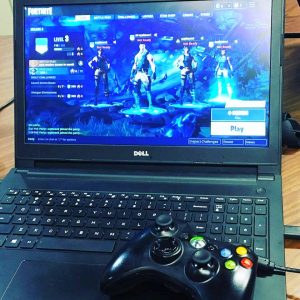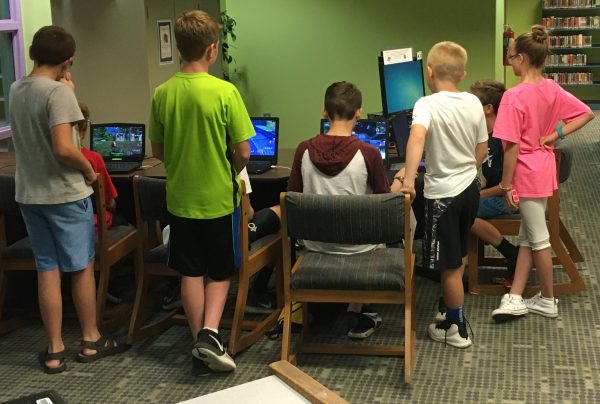2018 School Spending Survey Report
Fortnite Game a Win for Librarians Looking To Boost Teen Attendance
The video game Fortnite is officially a full-blown craze—and gaming events are a great way to bring teens into the library this summer.
 The video game Fortnite is officially a full-blown craze, which as summer vacation gets underway, shows no sign of letting up. For the uninitiated, Fortnite is one of the new breed of “battle royale” games, in which up to a hundred players descend onto an island to build fortifications while battling it out with rifles until one person is left standing—think Minecraft meets The Hunger Games. A big reason for the game’s wild popularity among kids is that it’s free. Kids can join an online battle just by signing in with an email address on their smart phones or on a school or library computer. Add in the colorful cartoon graphics and continuous near-missed victories, and you have one extremely addictive game.
The video game Fortnite is officially a full-blown craze, which as summer vacation gets underway, shows no sign of letting up. For the uninitiated, Fortnite is one of the new breed of “battle royale” games, in which up to a hundred players descend onto an island to build fortifications while battling it out with rifles until one person is left standing—think Minecraft meets The Hunger Games. A big reason for the game’s wild popularity among kids is that it’s free. Kids can join an online battle just by signing in with an email address on their smart phones or on a school or library computer. Add in the colorful cartoon graphics and continuous near-missed victories, and you have one extremely addictive game. 
Ready to play Fortnite at the Shelby Country (IN) Public Library. Photo courtesy of Dustin Jones
Teachers may be tired of catching students hunched over smart phones behind their desks in the throes of virtual combat, drawing suppressed cheers from their classmates, but the news about Fortnite and gaming is not all bad. Though some researchers advise teachers not to allow students to play the game in school—they also point out that multi-player games can bring kids together and promote collaboration and imagination, benefits that extend beyond the virtual world. These also happen to be experiences that Fortnite’s key audience of middle and high school kids crave. What’s required to make the most of Fortnite is an educator in the room who organizes game play and provides opportunities for kids to talk through their experience with the game. Public librarians are taking up the challenge, and they’re finding the library can be the perfect place for Fortnite. Several libraries around the country are holding Fortnite game nights this summer. It’s a strategy to get kids in the door who may also become regular visitors to other teen programs. Librarians say that Fortnite events they’ve hosted have drawn more kids to their libraries’ programs than ever before. For the teen and tween librarians who organized the events, the real success is measured by positive interactions the kids are having with the game—and with each other. “A big component is them cheering each other on and encouraging each other when they do something cool in the game, and the camaraderie that comes from seeing someone do well,” says Dustin Jones, teen librarian at the Shelby County (IN) Public Library. "It’s fun for them to watch their peers play the game.”
Fortnite fun at the Shelby County Public Library. Photo courtesy of Dustin Jones
Any video game that grabs kids’ attention can raise concern about violent content, but Sarah Prosser, the teen librarian at the Field Library, in Peekskill, NY, decided that Fortnite was a safe bet for her crowd. “I definitely saw why it received positive reviews from conservative websites,” she says. “There’s no blood, and the violence is cartoonish. It’s not meant to be realistic. That was how I could justify having it.” At Jones’s game night, about 10 sixth to eighth graders huddle in the library’s program room, each with their favorite controller brought from home and plugged in to one of the seven library laptops. Jones has already held several Fortnite game nights, each time drawing twice the number of kids that usually show up to his programs. He plans to devote every Tuesday night in July to Fortnite. At first, Jones tried to divide the kids into groups of four and make them play together, to encourage teamwork. But the kids found this too isolating. They wanted to talk about their experience. “There has been much more interaction when the Fortnite game is run in a solo mode,” Jones says. “They’re talking to each other about the game and the solo things they’re doing way more than they were as a four-person team.” John Scalzo, media librarian at the Irondequoit Public Library in Rochester, NY, and founder of “The Video Game Librarian” blog, says it’s mainly the social aspect of Fortnite that draws in the kids. Scalzo hasn’t held a dedicated Fortnite event, but he makes the game available on the library’s consoles. “The kids who come in to play typically don't know each other,” he says. “They're playing together and they're talking, and they're extremely good about making sure everyone gets a turn and feels included. They can scream and shout because it's their space. No one is going to shush them. This kind of group dynamic is just fun." Prosser also noticed that kids get as much of a thrill out of watching their friends play as they do playing the game themselves, which made a game night centered on only two gaming consoles, an Xbox 1 and PlayStation 4, a lot easier to manage. “They developed their own kind of competition, seeing how long each could survive,” Prosser says. “So I didn’t have to run it as a tournament.” Prosser’s recent Fortnite event boosted program attendance from 10 to 28 kids. When she visits classrooms to spread the word, she is met with stunned faces. “‘What?! You have Fortnite?’ they say. I’m already planning for another surplus of kids to come in.” While Prosser believes a Fortnite match unfolds a narrative as complex as any novel and promotes digital literacy, she has occasionally enticed kids into swapping the controller for a game of chess or Monopoly. Jones wonders if he would have attended programs at the library if they had offered video games when he was growing up. “I went for books, but I never went to libraries for their programs,” he says, “and as librarians we believe that books will always be important. But we also understand that libraries are becoming more accessible in digital ways. The library has a different meaning from what it has had for a lot of years. I think libraries are slow to recognize and become agile to that change.” Just keeping the library on the kids’ radar makes the Fortnite event worth it for Prosser. “The important part is just getting kids into the library. That’s the first step in getting them to continue coming to the library for other needs in their lives.” Brian Seto McGrath is a writer and editor for TIME Edge, a digital current events magazine for middle school classrooms
Brian Seto McGrath is a writer and editor for TIME Edge, a digital current events magazine for middle school classrooms RELATED
RECOMMENDED
CAREERS
The job outlook in 2030: Librarians will be in demand
CAREERS
The job outlook in 2030: Librarians will be in demand
ALREADY A SUBSCRIBER? LOG IN
We are currently offering this content for free. Sign up now to activate your personal profile, where you can save articles for future viewing






Add Comment :-
Comment Policy:
Comment should not be empty !!!
Jane L
Anyone running Fortnite on frozen PCs, how do you handle updates?Posted : Jul 11, 2018 12:20